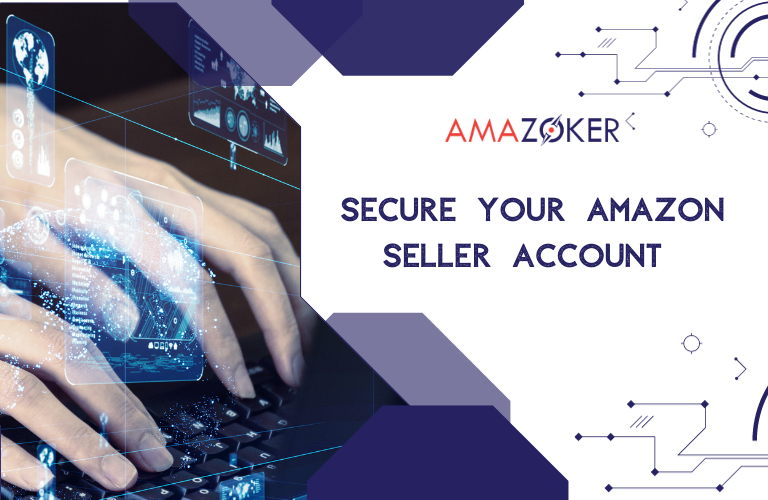For Amazon sellers, it is very important to know how to protect your Amazon account. With the platform’s immense reach and extensive user base, securing your Amazon Seller Account is not just about protecting your information but also safeguarding your business. Implementing key strategies can significantly bolster the security of your Amazon Seller Account and ensure a smooth and secure selling experience. Here are some tips on how to protect your Amazon seller account.
Secure Your Amazon Seller Account
One of the best ways to protect your Amazon seller account is to secure it with strong and unique credentials and settings. You can do this by following these steps:
- Start by meticulously reviewing and verifying all personal information associated with your Amazon Seller Account. Ensure that your name, address, contact details, and business information are accurate and updated. Any discrepancy in this data could not only affect your selling operations but also pose a security risk. You should also check your billing and payment history and see if there are any unauthorized or suspicious transactions or charges.
- Use a secure password: You should create and use a secure password for your Amazon seller account, which is a combination of letters, numbers, and symbols that is at least 8 characters long and hard to guess. Avoid using easily guessable information like birthdays or common phrases. You should also change your password periodically and avoid using the same password for other accounts or websites.
- Turn on 2-step verification: Enabling two-step verification adds an additional layer of security to your seller account. It requires both a password and a secondary form of verification, such as a code sent to your phone, making unauthorized access significantly more challenging for potential threats.

The best ways to protect your Amazon seller account is to secure it with strong and unique
Device and Network Security
Another way to protect your Amazon seller account is to secure your devices and networks that you use to access your Amazon seller account. You can do this by following these tips:
- Use antivirus software: You should install and update antivirus software on your devices, such as your computer, tablet, or smartphone, that can protect your devices from viruses, malware, spyware, or other threats that can compromise your data or identity.
- Use a VPN service: You should use a VPN service, which is a tool that encrypts your internet connection and hides your IP address, when you access your Amazon seller account from public or unsecured networks, such as Wi-Fi hotspots, cafes, or hotels. This can prevent hackers, snoopers, or trackers from intercepting or stealing your data or information.
- Log out and lock your devices: You should always log out of your Amazon seller account and lock your devices when you are not using them or when you leave them unattended. This can prevent unauthorized or accidental access to your Amazon seller account or devices.
Beware of Phishing Scams
A common way that hackers or scammers can try to access your Amazon seller account is by sending you phishing emails or messages that look like they are from Amazon, but are actually fake and malicious. These emails or messages may ask you to verify your account, update your information, confirm your order, or claim a reward, and may contain a link or an attachment that can lead you to a fake or harmful website or download. You can protect your Amazon seller account from phishing scams by following these guidelines:
- Do not open or click on suspicious emails or messages: You should always check the sender, subject, and content of any email or message that you receive, and look for any signs of phishing, such as spelling or grammar errors, mismatched or spoofed URLs, or urgent or threatening tone. You should also avoid opening or clicking on any links or attachments that you are not expecting or that look suspicious.
- Do not share your personal or financial information: You should never share your personal or financial information, such as your password, bank account, or credit card, with anyone who contacts you via email or message, even if they claim to be from Amazon or a trusted partner. Amazon will never ask you for your password or other sensitive information via email or message.
- Report and delete phishing emails or messages: You should report any phishing email or message that you receive to Amazon, and then delete it from your inbox or device. You should also report any phishing website that you encounter to Amazon by contacting their customer service.

The scammers can send you phishing emails or messages that look like they are from Amazon
Report Suspicious Account Activity
Regularly monitor your Amazon Seller Account for any irregular or suspicious activity. If you notice any unauthorized changes in your account information, unexpected alterations in listings, or any other suspicious behavior, report it to Amazon immediately. Prompt reporting can mitigate potential damages and aid in securing your seller account. You can report suspicious account activity by following these steps:
- Go to [Seller Central] and sign in with your credentials.
- Click on [Help] at the top right corner of the page.
- Select [Contact Us] from the drop-down menu.
- Under [Selling on Amazon], click on [Account Settings].
- Under [Issue Details], select [Other account issues].
- Under [Select Issue], select [Report a violation].
- Under [Select Details], select [A different issue].
- Under [Enter a brief description], describe the issue and provide any evidence or screenshots of the suspicious activity.
- Click on [Email] or [Phone] to contact Amazon and submit your report.
Amazon will investigate your report and take appropriate actions to resolve your issue and protect your account.
However, sometimes reporting suspicious account activity may not be enough or effective to protect your Amazon seller account. You may still face some problems or challenges, such as:
- Your account or products may be suspended or terminated by Amazon for violating their policies or standards, such as selling prohibited or restricted products, infringing intellectual property rights, or receiving negative feedback, reviews, or claims.
- Your account or products may be hijacked by another seller who takes over your product listing and sells counterfeit or inferior products under your brand name.
- Your account or products may be restricted by Amazon for requiring approval or authorization from Amazon or the brand owner, such as selling products in gated categories, brands, or subcategories, such as Health & Personal Care, Nike, or Topical Products.

Amazoker is a team of experts who can help you with any Amazon-related problems.
In these cases, you may need some professional help from an Amazon appeal service provider. An Amazon appeal service provider is a team of experts who can help you with any Amazon-related problems. They can help you write effective and persuasive appeal letters, communicate with Amazon’s seller performance team, and follow up with them until your account or products are reinstated.
One of the best Amazon appeal service providers that you can trust is Amazoker. Amazoker is a reputable and reliable Amazon appeal service provider that has helped thousands of sellers with their Amazon issues. They have a high rate of success, in-depth and free consultation, free repeat appeals until success, and reasonable quotation.
In a digital age where online security is paramount, know how to protect your amazon account is essential, so implementing these measures can significantly enhance the protection of your accounts. By securing your personal information, fortifying passwords, being vigilant against phishing attempts, and promptly reporting any anomalies, you empower yourself to navigate the digital landscape with confidence. Stay proactive, stay secure.
Read More:
>> Amazon seller identity verification
>> Amazon multiple account











